Glutamine is an amino acid that can combat lactic acid during a workout and increase muscle recovery times.
For this reason, glutamine is included in most pre workout supplements.
It plays a vital role in the biosynthesis of proteins and keeping everything from your brain to your gut, running smoothly. It is also one of the few amino acids that can cross the blood brain barrier.
Recent research has shown that glutamine however goes far beyond its role in protein biosynthesis. The more we learn about it, the more apparent the need for supplementation becomes.
It’s also a key building block for repairing and building muscle tissue. As such, it’s become quite popular among bodybuilders and fitness enthusiasts.
Glutamine could help you get stronger, increase your lean body mass, and handle tougher workouts with less muscular soreness and damage.
We’ve ranked the ten best glutamine supplements that you can get your hands on according to quality and efficacy.
Research
Rankings
1. Transparent Labs BCAA + Glutamine
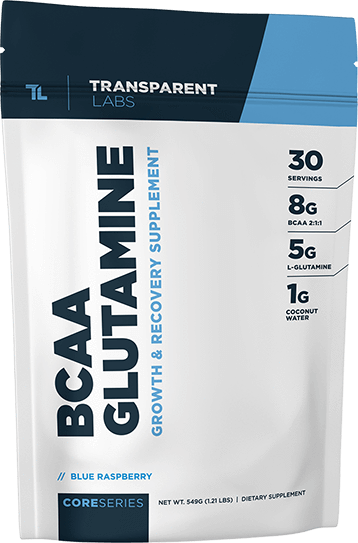
Click here for the lowest price
BCAA Glutamine by Transparent Labs is the most powerful way to get past muscle soreness.
Each serving contains a full 5 grams of l-glutamine but that’s just the beginning. You’re also getting a massive 8 grams of vegan-friendly fermented BCAAs plus 1-gram of coconut water extract.
Compared to a stand-alone l-glutamine powder, there is no competition.
Whether you take BCAA Glutamine pre-workout for more muscle growth, intra-workout for endurance or post-workout for recovery – this is the best tasting, most natural way to boost your amino acids.
Click here for the lowest price
2. MuscleTech Platinum Glutamine
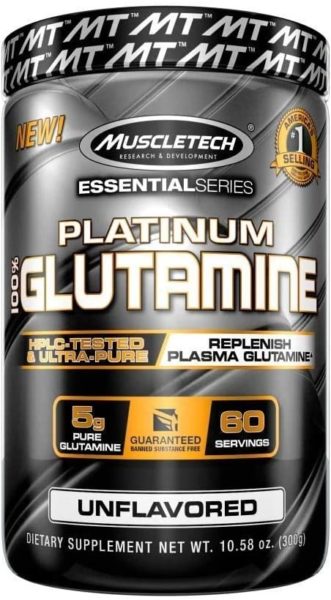
MuscleTech uses a specialized processing technology to reduce the particle size of its glutamine powder so it is more readily absorbed and easier to blend into shakes and smoothies.
It’s tested for purity and efficacy with advanced chemical analysis equipment, so you know that each 5000 mg scoop is going to be pure glutamine.
3. Optimum Nutrition Glutamine
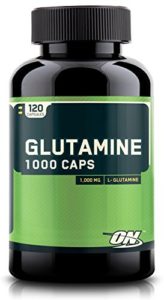
Optimum Nutrition’s glutamine capsules are the best choice if you want a capsule-based glutamine supplement. Each capsule has 1000 mg of glutamine in a gelatin capsule, with only magnesium stearate added to keep it shelf-stable.
For those seeking a moderate dosage, and for those who hate the taste of glutamine powder, it’s excellent. If you want to take several thousand milligrams of glutamine per day, it’s probably better to opt for a powder based supplement, and of course a strict vegetarian won’t go for a gelatin capsule.
That aside, just about everyone else can be happy with this glutamine supplement.
4. Evlution Glutamine
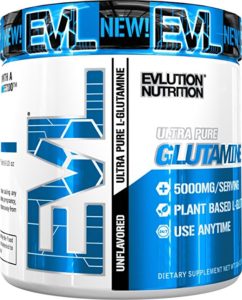
Evlution’s glutamine formulation is 100% pure glutamine powder. There are zero other ingredients; no stabilizers, no binders, and no flavoring agents.
This might not be what you want if you don’t like the taste of glutamine, you might not be a fan of taking 5000 mg of glutamine powder with no flavoring, but for serious glutamine users, this is a great choice.
5. BulkSupplements Pure Glutamine
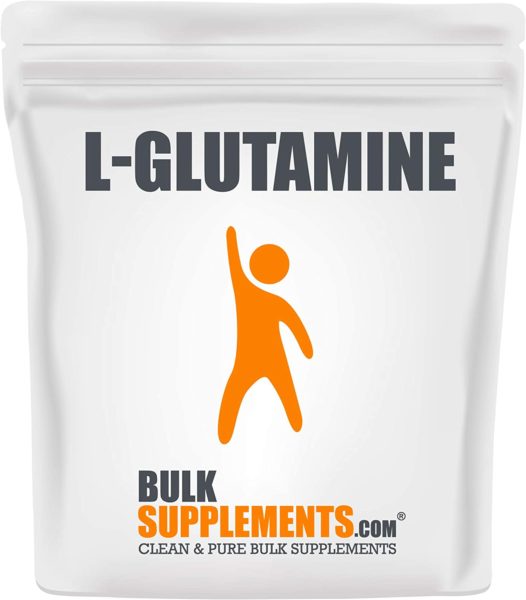
BulkSupplements is king when it comes to huge quantities of highly pure supplements in powder form. If you know you’ll be going through a tremendous amount of glutamine, it should be your go-to choice.
The large bags can be a little unwieldy, and they aren’t the greatest when it comes to staying closed, but the quality of the product itself is unassailable.
6. Kaged Muscle Glutamine
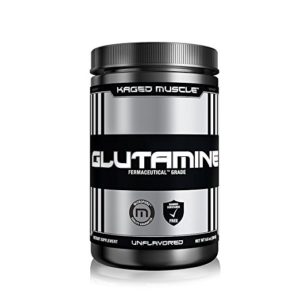
Kaged Muscle uses its trademark fermenting process to partially metabolize and active the glutamine in this supplement, which should lead to more effective absorption and better bioavailability.
With something taken in as high of a dose as glutamine, this may be less important than with other supplements, but it’s still a unique perk that you’ll only get with Kaged Muscle.
7. MP Essentials Glutamine
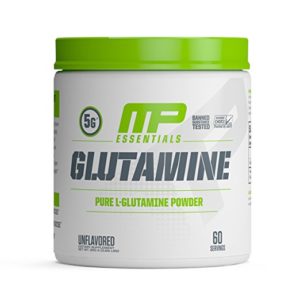
MusclePharm produces a powdered glutamine supplement like many of its competitors, and the quality is good: no extraneous ingredients, and each scoop contains a hefty amount of glutamine.
The main drawback is the fact that this powder is produced on the same equipment as other supplements that might contain gluten, dairy, or eggs. This means it’s not the right choice if you have food sensitivities. Other competitors offer similar products that are certified free of allergens.
8. BPI Sports Glutamine
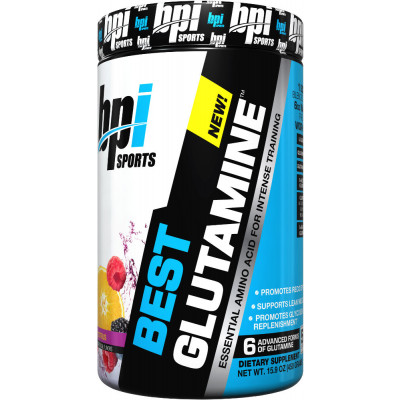
Coming in powder form, this glutamine supplement delivers six different metabolized forms of glutamine, totalling 6500 mg of glutamine per ser scoop.
It also includes 500 mg of vitamin C for extra antioxidant and recovery power. The dosage and variety of glutamine is great, but purists won’t like the artificial flavors and coloring agents.
9. Jarrow Formulas Glutamine
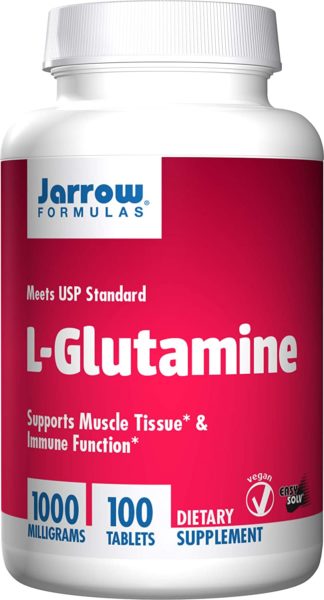
Jarrow Formulas offers a capsule-based glutamine supplement that’s vegetarian friendly and delivers 1000 mg of glutamine per capsule, but it can’t quite measure up to the purity of some of the other manufacturers that make glutamine pills. There are a few too many extraneous ingredients that other companies manage to get by without.
10. Now Sports Glutamine Powder
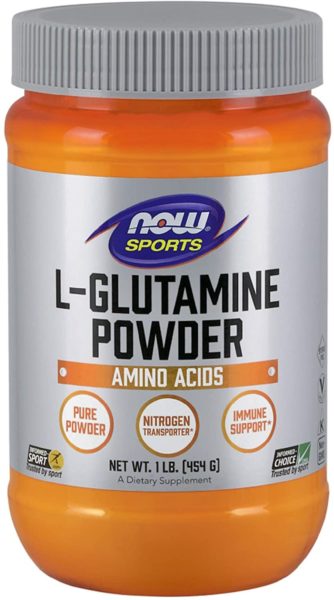
Now Sports has a pretty standard glutamine supplement. It’s powder-based, has no extra ingredients, and comes in a one-pound bottle, which is enough for almost 100 high-dose servings.
Now Sports doesn’t really distinguish itself with this supplement, and unfortunately its reputation is less than stellar with the quality of some of its other ingredients, so barring evidence to the contrary, it’s probably better to go with a competitor offering a similar product instead. Even so, there’s nothing objectively wrong with this supplement.
Category winners
Best glutamine overall: Transparent Labs BCAA + Glutamine
Combining the power of glutamine for recovery and BCAAs for muscle synthesis, Transparent Labs makes a killer glutamine supplement that’s easily the most versatile on the market. For all types of fitness applications, it should be your go-to choice.
Best glutamine for muscle soreness: Transparent Labs BCAA + Glutamine
Transparent Labs specifically uses BCAAs alongside glutamine to target the muscle damage and inflammation that contribute to muscle soreness—this combo supplement is our recommendation for athletes looking to overcome post-workout soreness.
Best glutamine for gut health: Optimum Nutrition Glutamine
Optimum Nutrition uses a capsule-based design to deliver precise doses of glutamine, making this a great choice if you are looking for a supplement for leaky gut and other gastrointestinal issues. The design is ideal for experimenting with different doses in 1000 mg increments, and the purity can’t be topped.
Best glutamine for women: MuscleTech Platinum Glutamine
Women who are serious about workout performance and workout recovery should go for MuscleTech Platinum. Its ultra-finely-powdered processing helps it get absorbed as quickly as possible, boosting both workout performance and post-workout recovery.
Best glutamine for muscle growth: Transparent Labs BCAA + Glutamine
Sustaining muscle synthesis means managing inflammation and providing your body with the building blocks it needs for muscle hypertrophy. You could get these from separate sources, but why not take a supplement that addresses both? Transparent Labs does exactly this, making it our pick for promoting muscle growth.
Best glutamine for athletic performance: MuscleTech Platinum Glutamine
Leveraging glutamine’s anti-lactate properties demands a rapidly-absorbed form of glutamine. Fortunately, MuscleTech is designed with this end specifically in mind. Taken before an intense workout, it’s your best option for boosting anaerobic performance.
Who should buy glutamine?
Glutamine is a versatile amino acid that’s most popular for boosting workout performance, enhancing workout recovery, and improving digestive and brain function.
It’s very popular among athletes thanks to research supporting its use in both pre- and post-workout formulations. That’s because glutamine, as an amino acid, plays a critical role in the synthesis of new muscle tissue.
It’s even been studied as a supplement to prevent sarcopenia and muscle wasting—the loss of muscle mass that happens in sick, bed-bound, or elderly people. Glutamine is also thought to play a role in the synthesis of new biological tissue elsewhere in the body, and has been intensely studied as a way to improve recovery after burn wounds, surgery, and other bodily trauma.
Finally, glutamine is one of the few amino acids that can cross the blood-brain barrier, and because of this ability, it may be able to improve memory and cognitive function.
Thanks to this wide range of versatility, glutamine can support at least three broad functions in your body: muscle synthesis and recovery, the health of your digestive tract, and your cognitive function. If you are looking for improvements in any of these domains of health, glutamine might be worth a look.
How we ranked
When developing our glutamine rankings, we kept the priority on purity and quality. Glutamate is a pretty heavily-researched supplement, so if you are using it, you probably want to follow a research-based protocol. For this reason, we focused solely on pure glutamine.
While some BCAA and post-workout supplements are based around glutamine, or include it as a key ingredient alongside other important amino acids, these products are not the best choice if you are specifically looking to use scientifically validated protocols for glutamine supplementation.
As such, we left these mixed products out of our rankings and only considered pure glutamine supplements.
Among the remaining glutamine products, we weighed the relative benefits and drawbacks of powder versus capsule form supplements.
With some applications of glutamine calling for high daily doses, powder-based supplements make it easy to take a lot of glutamine all at once, or to mix it into a protein shake or meal replacement. However, powders can be a bit of a mess, and it can be tough to measure out a precise dosage if you don’t have a precision scale.
For smaller doses, capsules are a much more convenient choice. Since capsules and powders both have their niche applications, we included both in our rankings. However, we used slightly different criteria to rate capsule based glutamine supplements and powder-based glutamine supplements.
For powder-based supplements, we awarded top ranks to 100% pure glutamine products that used independent laboratory testing for verifying purity and had certified good manufacturing processes.
For capsule-based supplements, we were looking for products that kept the additional binders and stabilizers to a minimum. We had a slight preference for vegetarian cellulose-based capsules as opposed to animal-based gelatin capsules, but this wasn’t a deal-breaker.
Capsule based supplements faced the additional requirement that the dosage be at least 1000 mg per capsule, since glutamine dosage is typically several grams per day. This requirement knocked out out a lot of products, leaving only a few high-quality capsules remaining.
We rated the remaining powder and capsule based glutamine supplements according to overall quality per the criteria above, which resulted in our final rankings of the best glutamine supplements available.
Benefits
Glutamine is a conditionally essential amino acid. Although glutamine is categorized as a non-essential amino acid (meaning our bodies can produce it), in certain conditions it becomes an essential amino acid.
During times of peak stress (such as illness or injury), the body cannot create enough glutamine and thus must rely on dietary supplementation (through food or pills) to meet the body’s high demands (1).
There are two forms of L-glutamine: Free form (regular) or Alanyl L-glutamine. Both forms provide the same benefits and can be consumed with a pre-workout or immediately after your workouts for maximum absorption and effect.
Alanyl l-glutamine is the combination of 2 amino acids: glutamine and L-alanine. The reason that it’s popular is that because it can be digested better and it is more stable, which is why its included in many BCAA mixes. Furthermore it’s easier to take on an empty stomach than regular l-glutamine.
Not everyone enjoys popping pills and while glutamine is conditionally essential, our modern diets don’t favour glutamine rich foods all the time. Here is a list of foods that are rich in glutamine so that pill or powder supplementation is not always necessary.
It is recommended that you consume 2-3 servings of these foods daily: spirulina, grass-fed beef, cottage cheese, bone broth, asparagus, turkey and wild fish (cod or salmon).
Glutamine improves immunity. Glutamine is responsible for enhanced immune defense. As one medical study pointed out, glutamine regulates the IgA antibody. This specific antibody attacks foreign, harmful bacteria as well as viruses. The better your body is at regulating this antibody, the faster it can attack invaders and the better prepared you are to any health threats.
Glutamine facilitates faster workout recovery. After an intense weight training session or any other form of exercise, stress levels are raised and glutamine is in high demand. The amount of glutamine normally found in one’s diet is not enough to cover all the bases. Therefore some supplementation is in order.
Glutamine supplementation can help your muscles last longer and push harder to squeeze out everything in your workouts. Furthermore it has been shown to improve muscle hydration (2). More hydration leads to less muscle damage and quickens recovery time from workout strains.
Glutamine has been shown to heal leaky gut syndrome. Leaky gut syndrome (or intestinal permeability) is a common problem today and affects millions. Leaky gut syndrome has been proven to cause chronic inflammation in the body and be a catalyst for diseases such as lupus, migraines, arthritis and multiple sclerosis.
Glutamine is a major source of fuel for cells – especially in the small intestine. One study examining 20 hospital patients found that supplementing with L-glutamine decreased overall intestinal permeability (3). Further studies have been done since then and they have all shown that glutamine supplementation can actually heal leaky gut syndrome and is the number one amino acid to help with repair.
Glutamine boosts growth hormone 400%. Human growth hormone (HGH) is a wonderful hormone that aids the body in building muscle, burning fat and staying healthy. It has been dubbed the youth hormone as well, for its anti aging effects in the body.
Research has been able to reveal that after supplementing with glutamine HGH levels are increased nearly 400% (4).
This massive hormonal response (which individuals pay $1000 per injection), leads to increased RMR (resting metabolic rate) burning more fat, protects muscle from catabolism and helps build more muscle (5).
Glutamine combats lactic acid during a workout. Ever felt that burning sensation when you workout? When you work out hard, your body builds up lactic acid in response to the fatigue setting in and your body not being able to generate enough oxygen. After a while your muscles will fail due to lactic acid build up.
The more lactic acid you can tolerate however, the harder and longer you can push your workout giving you better results every time you hit the gym. Thankfully glutamine can help you tolerate higher levels of lactic acid – according to studies done at LSU.
Just 2g of glutamine supplemented, increased bicarbonate levels and growth hormone over a 90 min window. Bicarbonate buffers, are what the body uses to combat acidity build up (such as lactic acid). Therefore taking glutamine before your next training session, could help you last longer and squeeze out those last 2-3 reps.
Glutamine can help treat trauma and burns. As we know, in times of injury glutamine is in high demand; so much so that it needs to be supplemented. However it does provide some amazing healing benefits. Take burn victims.
One double blind study examined 45 adults bearing severe burns. For recovery, some of them were given mixtures with glutamine, others were not. Researchers found that mortality rates were reduced, viruses were fought off and blood infections, from the burn wounds were significantly reduced – in those taking the glutamine mixture.
Glutamine can speed postoperative recovery times. Thankfully the body doesn’t know the difference between accidental trauma, and elective trauma. Randomized studies have proven it: Patients receiving glutamine supplementation in postoperative patients decreased length in hospital stay.
Glutamine can support full body detoxification efforts. Glutamine plays a variety of roles in the human body, but one that stands out is its support for detoxification. Specifically detoxifying high levels of ammonia. High levels of ammonia can be dangerous in the body and a sign of liver or kidney damage.
Glutamine acts a buffer against rising levels of ammonia, turning the excess into various amino acids and sugar (6). This prevents excess build up in the body and keeps everything running smoothly. That being said, glutamine supplementation is not a cure and should you suspect high ammonia levels – seek medical attention immediately.
Glutamine can help with memory, focus and attention. Glutamine is one of the most versatile and its ability to cross the blood brain barrier gives it a unique advantage. It is often called brain fuel because glutamine is utilized to create GABA and glutamic acid – two of the most important neurotransmitters involved in thinking, memory and mood regulation (7).
Glutamine reverses muscle wasting. After an intense workout your body is depleted of amino acids, especially glutamine. This is the perfect muscle wasting state aka muscle catabolism. Supplementing with glutamine right after your workout can stop muscle catabolism dead in its tracks (9).
It can help bedridden patients even more. Research has shown that oral supplementation with glutamine can reverse muscle wasting in those with HIV/AIDS or advanced cancer (10).
Glutamine shows some promise in early research as an antidepressant. Although glutamine is a known neurotransmitter, there has been surprisingly little research into its possible use for modulating brain chemistry to improve health and wellbeing.
Some initial work has been conducted, though, such as one study published in 2018 in the journal Neuropharmacology by a team of researchers in South Korea (11). The study involved studying the effects of glutamine on a specific area of the brain called the medial prefrontal cortex.
By studying the effects of glutamine and related biochemical compounds, the researchers found that glutamine is able to exert chemical changes similar to those seen in antidepressants.
These results suggest that glutamine could be useful for treating depression, though studies of single neurons under a microscope are a long way from clinical trials of glutamine supplementation for treating depressive disorder. Still, it’s a promising frontier in using simple amino acids for depression.
Glutamine could help improve blood vessel health. Some of the more recent research on using glutamine as a supplement has investigated it alongside other compounds that are involved in the same biochemical reactions that glutamine takes part in.
A 2015 paper published in the European Journal of Clinical Nutrition used the biochemical reactions that glutamine takes part in to motivate a clinical trial of a supplement that combined glutamine with HMB and L-arginine in a study on 31 adults age 65 and older (12).
The study split the volunteers into two groups, one of which received a placebo supplement, while the other group received a supplement that provided three grams of HMB, 14 grams of glutamine, and 14 grams of L-arginine.
The adults were followed for 24 weeks, during which the researchers tracked the blood vessel function of all of the subjects using a technique called flow-mediated dilation, which measures how easily blood can flow through blood vessels.
At the study’s conclusion, the researchers found a 27% increase in blood flow. These changes were important because blood vessel function has been identified as an independent risk factor for heart disease, and blood vessel function typically declines as you get older.
Thanks to this study, we know that glutamine could be useful in combination with other amino acid derivatives to improve your blood vessel function.
Side effects
Glutamine may cause increased thirst and dehydration because of its ability to retain water in the body. Other possible side effects include dizziness, depression, insomnia, headache and skin rashes.
As awful as all of those sound, it should be said that the possibility of overdosage and side effects is quite low. According UMMC glutamine is safe in doses of 14g or higher.
Diabetics should be careful using glutamine, because it has been shown that they metabolize glutamine abnormally. Individuals with liver or kidney problems should consult a doctor first.
Recommended dosage
For the average joe, 10g split over 2 doses is plenty of glutamine. For serious athletes, the dosing is doubled to 20g daily (split over 2 doses).
While long term supplementation of glutamine hasn’t shown to cause any issues, to avoid excess build up in the body, one may want to supplement with B vitamins (specifically B12). They will help in controlling glutamine levels and ensuring you don’t get too much of a good thing.
Glutamine can be taken using pills or powders.
Let’s make one thing clear: there is no physiological advantage to taking one or the other here if the doses are the same. It really just comes down to 3 things: price, taste and convenience. Taste is negligible in powder form. You’ll barely notice it. As for price, capsules tend to be more expensive because of the process of encapsulating everything.
FAQ
Q: What is glutamine?
A: Glutamine is an amino acid that’s used in a wide range of biological processes. It’s technically considered “non-essential,” meaning that your body can synthesize glutamine on its own from other amino acids if it has to.
Though it is possible for your body to synthesize glutamine from other compounds, that doesn’t mean there are no benefits to consuming it as a part of your diet.
Q: What is glutamine supplement used for?
A: Glutamine, due to its wide range of biological uses, has a wide variety of health benefits. It’s often used by athletes to improve performance, boost growth hormone levels, and improve recovery after particularly tough training programs.
Because of its ability to boost recovery, it also finds use in hospitals for recovering from trauma. But glutamine also plays a role in brain chemistry, the function of your immune system and digestive system, and could even improve blood vessel function when used in combination with other amino acid derivatives. Though glutamine is a simple molecule, it has a huge number of uses.
Q: What foods are high in glutamine?
A: Since glutamine is an amino acid, you’ll find it in lots of different protein-rich foods. This includes eggs, milk, cheese, tofu, lentils, fish, and chicken, to name a few.
While it is a little tougher for vegetarians and vegans to get a lot of glutamine, with sources like lentils, beans, and spinach, you should still be able to get a good amount of glutamine from your diet.
If you’re looking to up your glutamine intake even more, a supplement is a great way to go, since it gives you direct control over
Q: When should you take glutamine?
A: Almost all research based protocols split up the daily dose of glutamine into several smaller doses. For example, if you were aiming to take 10 grams of glutamine per day, you might split this total dosage into five doses of two grams, spread throughout the day.
Doing so should ensure your body gets a steady supply of glutamine all day long, which will maximize the benefits.
Q: Is glutamine useful for weight loss?
A: Glutamine has not been heavily studied for weight loss, but one study does indicate that glutamine could induce satiety and increase fat oxidation (13).
Glutamine is often used to prevent muscle wasting in people who are hospitalized, but its mechanism of action here is thought to be increasing muscle mass.
So it might be more correct to say that glutamine shows some potential for use as a way to lose fat, but not necessarily body weight overall, as it could also help increase your muscle mass.
The increased fat oxidation and reduced hunger after ingestion of glutamine should not be a surprising effect, given that protein powder generally is known to induce an increase in energy expenditure and have an appetite suppressing effect.
Q: How long does it take for glutamine to repair your intestines?
A: Glutamine has been studied as a possible treatment for leaky gut syndrome, but the timescale of its effect is fairly long. Most studies are several months; some last over a year (14).
While you shouldn’t interpret this to mean that it will necessarily take that long for glutamine to work, that’s still the timescale that the researchers designing studies think is adequate to sufficiently capture the benefits of glutamine for leaky gut.
Q: How do you take glutamine?
A: Glutamine can be taken in capsule or in powder form. The best protocol for taking glutamine is to split your daily dosage up into three, four, or even five equal portions, and space them out evenly throughout the day.
So, if you were taking 12 grams of glutamine per day, you could take a three gram dosage four times per day. If you are taking capsules, it’s easy to count out the right number of pills for the correct dosage. If you are using powder, you can use a scoop or use a scale if you want to be more precise.
Powder-form glutamine is easy to mix into a protein shake, smoothie, or green drink. You’ll have to get a little creative on how to fit glutamine into your dietary routine, but splitting up the dosages is the best and most effective way to take glutamine supplements.
Q: Is glutamine a BCAA?
A: No, glutamine is not a branched chain amino acid. Only valine, isoleucine, and leucine are branched chain amino acids.
However, these three BCAAs are a critical supply for the molecular precursors that your body uses to synthesize glutamine when your dietary or supplemental supply is not sufficient.
So, while glutamine is not one of the three branched chain amino acids, there is a deep chemical connection between BCAAs and glutamine.
Q: What is the difference between glutamine and L-glutamine?
A: L-glutamine refers to the molecular form of glutamine that is found in nature. Many molecules have a “mirror image” that is possible to synthesize, and glutamine is no exception.
It is possible to make “D-glutamine” in a lab, which is a mirror image of L-glutamine, which has no use in humans but is used in mice.
However, in all cases outside of advanced biochemistry labs, you can assume that “glutamine” refers to the naturally occurring L-form of glutamine. All of the research we’ve looked at in this article, for example, has concerned only the L form of glutamine.
Q: What does glutamine do for your workout?
A: Glutamine is a very popular ingredient in post-workout supplements, and is often taken on its own to boost recovery after difficult training sessions.
Glutamine plays a key role in the synthesis and maintenance of muscle tissue, so after a tough session at the gym when your muscles are damaged, glutamine helps repair damaged muscles cells.
Hopefully, if you have adequate recovery, you will restore your muscles beyond their previous state, leading to an increase in strength and size in the long run.
Related articles
- BCAAs
- BCAAs for women
- Intra-workout supplements
- Post-workout supplements
- L-arginine
- HMB
- Pre-workout for women
- Pre-workout
Recap
Whether you are using it for muscle building, athletic performance or healing leaky gut, glutamine should be part of your daily diet.
You can find it in foods, but for the best research-based results, you’ll want to take a glutamine supplement. Split your supplement up into several doses taken throughout the day for best results.
For BodyNutrition’s #1 glutamine recommendation, click here.